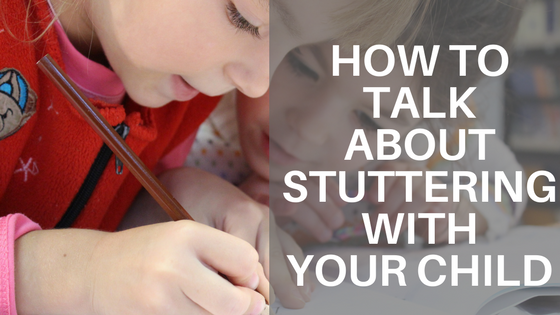
05 Jul How to Talk About Stuttering with Your Child
When your child is stuttering, your heart goes out to them. You want to help your child, but compounding the embarrassment or anxiety your child may feel could only make matters worse. In this article, we’ll discuss how to effectively talk to your child without causing undue fear or shame.
Know the Facts
Knowing the facts can help you talk to your child. While he/she may be too young to understand statistics, it may help your child to know that many other children deal with stuttering:
- Did you know that approximately 5% of the children between the ages of 2 and 5 develop a stuttering disorder, also called stammering?
- 1 out of every 100 children will continue stuttering into adulthood. That’s around 3 million people worldwide. Lifelong stuttering affects everything a person does, their ability to communicate with others, share their feelings and needs, negotiate, work effectively with a team. But you may not want to share that part of it with your child.
Even basic facts like this can help soothe your child’s fears. Start small, then move the discussion forward, depending on your child’s age and ability to understand and discuss it.
Acknowledge; Don’t Judge
You can’t resolve a challenge if you don’t first acknowledge that it exists. If you’ve never talked to your child about this, know that he/she likely already knows. Even if you have never verbalized it, children are highly perceptive. They can sense when a parent is a little frustrated, feeling impatient or feeling “sorry for” the child. Even young children realize that something isn’t quite right. It might be best to get it out in the open in a constructive way. Research shows that ignoring it does not make it go away.
Empathize
With compassion, say things like:
- “All kids have trouble putting words together when they’re learning.”
- “Sometimes I have trouble finding the right word too.”
- “I’m so glad that you talk to me even though it’s hard sometimes.”
- “I love to hear what you have to say.”
- “Everyone has trouble talking sometimes.”
- “Everyone has to ask people to repeat themselves sometimes. Sometimes we just don’t hear everything that someone is saying. Could you repeat that please?” (If you couldn’t understand)
Simple phrases like this help your child feel more comfortable with their stuttering and can make them feel more open to speaking to you about it..
Be Mindful of Body Language
Kids pick up on non-verbal cues — often better than adults. Your first response may be to sigh, grimace or force a smile while saying something nice. You may allow frustration to take hold of you, even if you don’t show any outward signs. Your child knows you and can feel that even if you think you’re hiding it well. They know when your words don’t match your body language and energy. Be aware of this and work toward approaching the situation with positivity and love.
Talk with Your Child About Visiting a Speech Therapist
Talk with your child about what a speech/language pathologist can do to help. Explain that visits will be fun. The therapist will play games with that will help him/her speak more clearly and confidently. Let your child know that the therapist will also work with you to better understand how you can be a better listener. Share that you’ll be working on this together and always remind your child of the love and acceptance you have for him/her.
Find Help with Stuttering in Dallas TX
At Bliss Speech and Hearing Services, Inc. we are committed to helping children and their families communicate clearly to enhance the quality of life. If your child is struggling with stuttering, please give us a call: 972 387 2824. Or contact us via our website.




No Comments